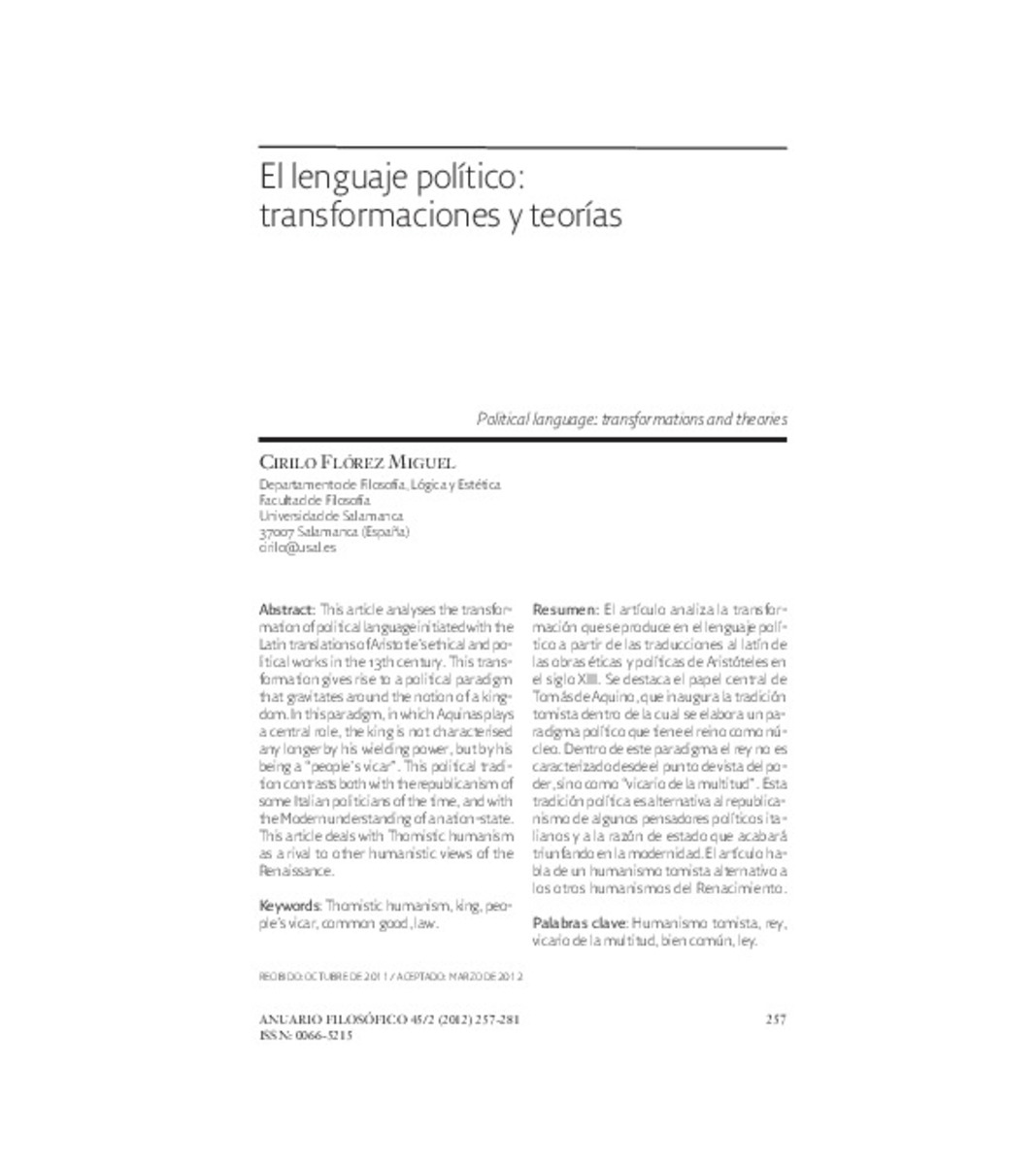Full metadata record
| DC Field | Value | Language |
|---|---|---|
| dc.creator | Flórez, C. (Cirilo) | - |
| dc.date.accessioned | 2017-09-12T08:43:27Z | - |
| dc.date.available | 2017-09-12T08:43:27Z | - |
| dc.date.issued | 2012 | - |
| dc.identifier.citation | Flórez, C. (Cirilo). "El lenguaje político: transformaciones y teorías". Anuario Filosófico. 45 (2), 2012, 257 - 281 | es |
| dc.identifier.issn | 0066-5215 | - |
| dc.identifier.uri | https://hdl.handle.net/10171/43791 | - |
| dc.description.abstract | El artículo analiza la transformación que se produce en el lenguaje político a partir de las traducciones al latín de las obras éticas y políticas de Aristóteles en el siglo XIII. Se destaca el papel central de Tomás de Aquino, que inaugura la tradición tomista dentro de la cual se elabora un paradigma político que tiene el reino como núcleo. Dentro de este paradigma el rey no es caracterizado desde el punto de vista del poder, sino como “vicario de la multitud”. Esta tradición política es alternativa al republicanismo de algunos pensadores políticos italianos y a la razón de estado que acabará triunfando en la modernidad. El artículo habla de un humanismo tomista alternativo a los otros humanismos del renacimiento. | - |
| dc.description.abstract | This article analyses the transformation of political language initiated with the Latin translations of Aristotle’s ethical and political works in the 13th century. This transformation gives rise to a political paradigm that gravitates around the notion of a kingdom. In this paradigm, in which Aquinas plays a central role, the king is not characterised any longer by his wielding power, but by his being a “people’s vicar”. This political tradition contrasts both with the republicanism of some Italian politicians of the time, and with the Modern understanding of a nation-state. This article deals with Thomistic humanism as a rival to other humanistic views of the Renaissance. | - |
| dc.language.iso | spa | - |
| dc.publisher | Servicio de Publicaciones de la Universidad de Navarra | - |
| dc.rights | info:eu-repo/semantics/openAccess | - |
| dc.subject | Humanismo tomista | - |
| dc.subject | rey | - |
| dc.subject | vicario de la multitud | - |
| dc.subject | bien común | - |
| dc.subject | ley | - |
| dc.subject | Thomistic humanism | - |
| dc.subject | king | - |
| dc.subject | people’s vicar | - |
| dc.subject | common good | - |
| dc.subject | law | - |
| dc.title | El lenguaje político: transformaciones y teorías | - |
| dc.title.alternative | Political language: transformations and theories | - |
| dc.type | info:eu-repo/semantics/article | - |
| dc.identifier.doi | 10.15581/009.45.1207 | es_ES |
| dadun.citation.endingPage | 281 | - |
| dadun.citation.number | 2 | - |
| dadun.citation.publicationName | Anuario Filosófico | - |
| dadun.citation.startingPage | 257 | - |
| dadun.citation.volume | 45 | - |
| dc.date.updated | 2017-09-12T08:43:27Z | - |
| dc.description.version | Peer Reviewed | - |
Files in This Item:
Statistics and impact
Items in Dadun are protected by copyright, with all rights reserved, unless otherwise indicated.






